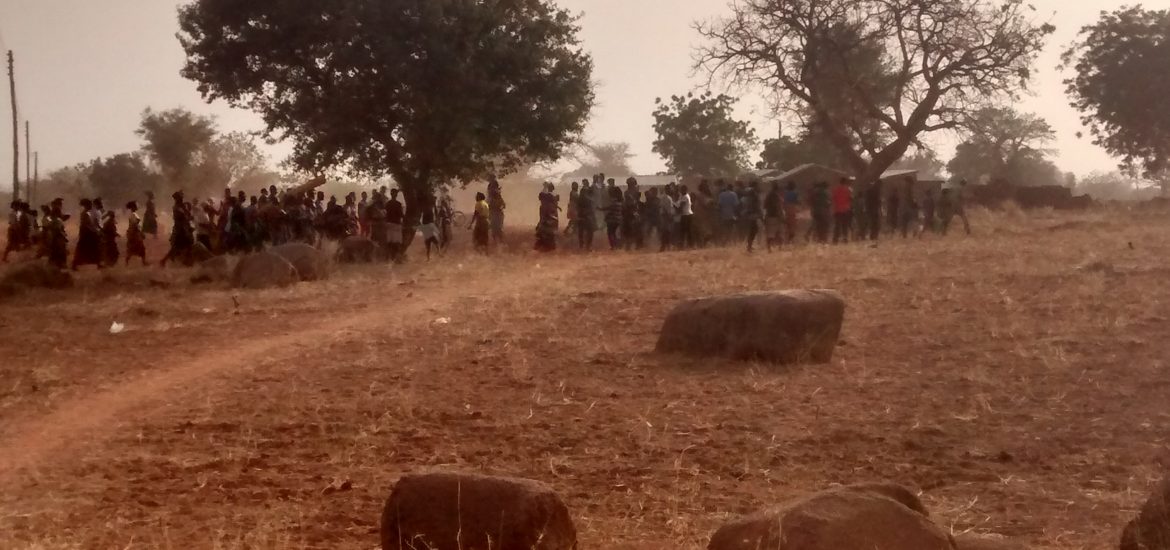After three months researching food sovereignty and food systems in Vea, a village in Northern Ghana, I discovered that global projects such as food sovereignty issuing generalised values or principles can be problematic, especially to specific sociopolitical contexts such as a rural African village, with its own cultural ideals and ‘rules’.
In this case, the values were gender equality and land ownership. Seemingly universal, gender equality sounds simple and like a ‘good idea’, and it is certainly central to the food sovereignty debate, as put forward by La Via Campesina (LVC).
As Patel (2012) notes, some of food sovereignty’s core principles are “non-negotiable”[1], and are “preconditions”[2] for its very existence. A prime example of this is LVC’s commitment to women’s rights, which are manifested in equal opportunities, equal access to resources, and equal ownership. Desmarais, Wittman and Wiebe (2011) intimate that this is due to women’s categorical placement alongside food and food related issues:
“Because women play a key role in food production and procurement, food preparation, family food security and food culture, the social and political transformation embedded in the food sovereignty concept specifically entails changed gender relations”.[3]
However, I found that these changed gender relations envisioned by the food sovereignty movement are complicated by the fact that in Vea, and indeed in many societies across the globe, women simply cannot own land. Although they are afforded some respect, particularly with age, women are not treated equally to men in this regard, and I am not sure this is something that is likely to change in the near future. Indeed, would it be fair or reasonable to insist that it does? A key component of food sovereignty being present is an entitlement to “culturally appropriate” food – but what about culturally appropriate policies? Is it even possible to issue top-down universal ‘rights’ that are designed to extend to so many different geopolitical spaces? If so, they must be manoeuvred around delicately.
Ownership vs. Access
As Patel (2009) again points out, food sovereignty’s actual “demands” are based on ‘“access to land’ rather than ‘ownership of land’. The whole scope of power through ownership – be it of land, intellectual property rights or gene patents – is challenged by La Via Campesina in various ways.”[4] This focus on ownership may also be due, in part, to LVC’s Latin-American beginnings. As Rosset and Martinez-Torres found in a 2005 interview with an African peasant leader, LVC was felt to be “very Latin American” by African audiences in its early stages, which is reflected in its views about land; as the same authors show in a later article, “Latin America is the region of the world with the most unequal distribution of land and income,” and therefore this focus is understandable in the context of LVC’s evolution as a movement.[5] Now though, it is important to clearly define what is meant by gender equality in varying contexts, and how LVC hope to craft a new future including “changed gender relations”[6].
As I looked deeper into other African feminist perspectives, I realised that another key aspect of food sovereignty also needed to be addressed – the ‘right to choose’. Bawa (2016) points out that a woman’s social status as a wife, sister, daughter, or mother, defines her access to land and “socioeconomic progress.” The institution of motherhood is a much more powerful, prestigious one than in Western cosmologies,[7] which calls into question the very idea of individual ownership being a marker of success, and indeed, the individual being an appropriate unit of measurement at all: For a Ghanaian woman, her relationships and network may be a more significant statement of her life than her individual ‘self’. However, if women are outcast by society then their self-sufficiency and ingress to land are also gone. Although rare, it can certainly confound the idea of gender equality, as men can quite easily move to a new village and start anew, albeit as a ‘stranger’, while women in this position, without a support network, do not have such options.
Without a clear roadmap in this area it may be hard to see how food sovereignty will move beyond an aspirational project, or make real lasting changes in the complex sphere of women’s rights and self-determination in the African context. As Patel (2009) puts it; “If we talk about food sovereignty, we talk about rights, and if we do that, we must talk about ways to ensure that those rights are met across a range of geographies, by everyone and in substantive and meaningful ways.[8]” This range of geographies must be considered carefully if issues such as ‘rights’ and ‘equality’ are to be invoked, as they may not be as universal or clear-cut as they first appear.
Sources
[1] Patel, R. (2012) ‘Food Sovereignty: Power, Gender and the Right to Food’ PLoS Medicine, 9(6):2.
[2] Patel, R. (2009) ‘Grassroots Voices: What does Food Sovereignty Look Like?’ The Journal of
Peasant Studies 36(3): 665.
[3] Wittman, H., Desmarais, A.A. and Wiebe, N. (2011) Food Sovereignty: Reconnecting Food,
Nature & Community Oxford, Pambazuka Press: 5.
[4] Patel, R. (2009) op. cit. : 664, emphasis mine.
[5] Rosset, P., and Martinez-Torres, M.E. (2010) ‘La Via Campesina: The Birth and Evolution of a Transnational Social Movement’ The Journal of Peasant Studies 37(1): 153-4.
[6] Wittman, H., Desmarais, A.A. and Wiebe, N. (2011) op. cit.: 5.
[7] Bawa, S. (2016) ‘Paradoxes of (dis)empowerment in the Postcolony: Women, Culture and Social Capital in Ghana’ Third World Quarterly 37(1): 121-131.
[8] Patel, R. (2009) op. cit.: 665.
